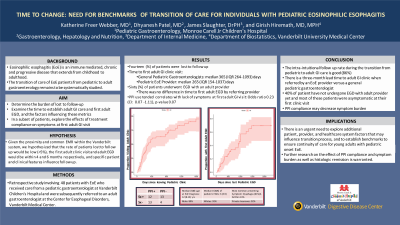Sunday Poster Session
Category: Pediatrics
P1181 - Time to Change: Need for Benchmarks for Eosinophilic Esophagitis Transition of Care
Sunday, October 22, 2023
3:30 PM - 7:00 PM PT
Location: Exhibit Hall

Has Audio
- KF
Katherine Freer Webber, MD
Vanderbilt University Medical Center
Nashville, TN
Presenting Author(s)
Katherine Freer Webber, MD, Dhyanesh Patel, MD, James Slaughter, BS, Girish Hiremath, MBBS, MPH
Vanderbilt University Medical Center, Nashville, TN
Introduction: Objectives: Eosinophilic esophagitis (EoE) is an increasingly prevalent gastrointestinal disease extending from childhood to adulthood. However, the transition of care of EoE patients from pediatric to adult gastroenterology remains to be systematically studied. We examined the burden of lost to follow up, time to transition, and the factors influencing the transition of care of individuals with pediatric-onset EoE.
Methods: We reviewed medical record of 49 patients with EoE who received care from a pediatric gastroenterologist at Vanderbilt Children's Hospital and were subsequently referred to an adult gastroenterologist at the Center for Esophageal Disorders, Vanderbilt Medical Center. Continuous and categorical variables are presented as median (IQR) and percentage, respectively.
Results: Seven (14%) patients did not establish care with the adult gastroenterologist. Remaining 42 (86%) patients established care with adult gastroenterologist. Their median age at diagnosis was 12 (8-15); 80% were males, 92% were White, and 92% had private health insurance. Dysphagia (61%) and abdominal pain (35%) were the most common presenting symptoms, and 46% had food allergies. They had undergone 6 (3-9) pediatric esophagogastroduodenoscopies (EGDs). Their first adult clinic visit was 264 (130-791) days after the last pediatric clinic visit, and their first adult EGD was 639 (197-1010) days after the last pediatric EGD. There were no differences in the time to their first adult clinic visit or their first adult EGD when patients were referred from a pediatric EoE specialist versus a general pediatric gastroenterologist (p = 0.58 and p = 0.93, respectively). No relationship was observed between the time to the first adult clinic visit or the first adult EGD and the age at diagnosis, peak eosinophil count (PEC) on the diagnostic EGD, or the PEC at the last pediatric EGD (p=0.27, 0.28, 0.19, respectively).
Discussion: Conclusion: This study highlights a notable proportion of young EoE patients being lost to follow up during their transition from pediatric to adult care. Furthermore, there is a concerning gap in clinical care during their transition with EoE with no clear associations with some of the patient and clinical factors. There is an urgent need to explore additional patient, provider, and healthcare system factors that may influence the transition process and establish benchmarks to ensure continuity of care of young adults with pediatric onset EoE.
Disclosures:
Katherine Freer Webber, MD, Dhyanesh Patel, MD, James Slaughter, BS, Girish Hiremath, MBBS, MPH. P1181 - Time to Change: Need for Benchmarks for Eosinophilic Esophagitis Transition of Care, ACG 2023 Annual Scientific Meeting Abstracts. Vancouver, BC, Canada: American College of Gastroenterology.
Vanderbilt University Medical Center, Nashville, TN
Introduction: Objectives: Eosinophilic esophagitis (EoE) is an increasingly prevalent gastrointestinal disease extending from childhood to adulthood. However, the transition of care of EoE patients from pediatric to adult gastroenterology remains to be systematically studied. We examined the burden of lost to follow up, time to transition, and the factors influencing the transition of care of individuals with pediatric-onset EoE.
Methods: We reviewed medical record of 49 patients with EoE who received care from a pediatric gastroenterologist at Vanderbilt Children's Hospital and were subsequently referred to an adult gastroenterologist at the Center for Esophageal Disorders, Vanderbilt Medical Center. Continuous and categorical variables are presented as median (IQR) and percentage, respectively.
Results: Seven (14%) patients did not establish care with the adult gastroenterologist. Remaining 42 (86%) patients established care with adult gastroenterologist. Their median age at diagnosis was 12 (8-15); 80% were males, 92% were White, and 92% had private health insurance. Dysphagia (61%) and abdominal pain (35%) were the most common presenting symptoms, and 46% had food allergies. They had undergone 6 (3-9) pediatric esophagogastroduodenoscopies (EGDs). Their first adult clinic visit was 264 (130-791) days after the last pediatric clinic visit, and their first adult EGD was 639 (197-1010) days after the last pediatric EGD. There were no differences in the time to their first adult clinic visit or their first adult EGD when patients were referred from a pediatric EoE specialist versus a general pediatric gastroenterologist (p = 0.58 and p = 0.93, respectively). No relationship was observed between the time to the first adult clinic visit or the first adult EGD and the age at diagnosis, peak eosinophil count (PEC) on the diagnostic EGD, or the PEC at the last pediatric EGD (p=0.27, 0.28, 0.19, respectively).
Discussion: Conclusion: This study highlights a notable proportion of young EoE patients being lost to follow up during their transition from pediatric to adult care. Furthermore, there is a concerning gap in clinical care during their transition with EoE with no clear associations with some of the patient and clinical factors. There is an urgent need to explore additional patient, provider, and healthcare system factors that may influence the transition process and establish benchmarks to ensure continuity of care of young adults with pediatric onset EoE.
Disclosures:
Katherine Freer Webber indicated no relevant financial relationships.
Dhyanesh Patel indicated no relevant financial relationships.
James Slaughter indicated no relevant financial relationships.
Girish Hiremath indicated no relevant financial relationships.
Katherine Freer Webber, MD, Dhyanesh Patel, MD, James Slaughter, BS, Girish Hiremath, MBBS, MPH. P1181 - Time to Change: Need for Benchmarks for Eosinophilic Esophagitis Transition of Care, ACG 2023 Annual Scientific Meeting Abstracts. Vancouver, BC, Canada: American College of Gastroenterology.
